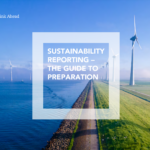AccountAbility launched the AccountAbility 1000 (AA1000) Framework in November 1999 to provide a practical framework for organisations to address issues of accountability and to improve overall performance. At its heart is a quality management process based on stakeholder engagement.
Organisations apply AA1000 in many and varied ways. It acts as a guide to best practice in social responsibility in business and not-for-profit organisations world wide. In an increasing number of cases, organisations are publicly referring to their use of AA1000 or are using independent advisors to provide statements of quality assurance matched against the contents of AA1000. AA1000 is referenced in published reports from organisations as varied as Agrocel, British Airways, Camelot, the Co-operative Bank, CIS, CWS, the Ford Motor Company, London & Quadrant Housing Group, Novo Nordisk, Shared Earth, Southern Sun Group, Traidcraft, TXU Europe, University Hospital Lewisham and Van City. It has also informally influenced a far larger group.
AccountAbility is committed to developing a revised version of AA1000 in 2001. AA2000 – Accountability Management will build on an analysis of the use of AA1000 and other standards and tools, and an assessment of the needs expressed by corporations and their stakeholders for quality processes of accountability management.
AA2000 – Accountability Management
AA2000 – Accountability Management will be launched as a fully designed exposure draft in early October 2001 and will receive a full release in Spring 2002, with on-going practitioner notes.
Up to and in between these milestones will be an extensive international consultation process built both around AccountAbility’s membership and the wider communities of which it is a part.
Five areas for development have emerged as being of particular importance: Innovation & learning, stakeholder engagement, management systems, assurance and governance & risk management.
There is an increasing recognition of the need to link corporate citizenship to organisational learning processes and related approaches to knowledge management – to maximise both the business and societal benefits from effective knowledge management and innovation, and in particular to offset the disadvantages of increased codification of corporate citizenship.
There is an emerging concern that the heavy investment in stakeholder engagement is not delivering businesses with useful information, improving decision-making, or even necessarily enhancing basic reputation. There has been a call from many users or would-be AA1000 users to focus on this element in the revisions process.
There is a clear need to clarify how best to manage key elements of corporate citizenship, and to build cost-efficient management systems relevant to different type of businesses that avoid the one-size-fits-all approach. There is a particular need to link back to mainstream existing management tools, such as EFQM and the Balanced Scorecard, and to focus on the need for business unit and well as corporate-level accounting and reporting of large companies, and the specific needs of SMEs.
There is an urgent need for clear guidance and a basic level of standardisation on quality assurance (particularly the role and approach of external verifiers) to enhance quality and credibility, ensure cost-effective delivery, and secure a more credible basis for communicating the results of accounting and reporting.
Governance remains a black box in organisational performance, with few companies reporting on activities such as public policy and risk management. While boards of directors are keen to minimise risk, the methods they employ are often ad hoc, and the learning from issues management discontinuous.
AA2000 – Accountability Management will provide a management framework that embraces each of the five elements above. It will support the transparency, learning and innovation necessary for accountability and sustainable value creation.



